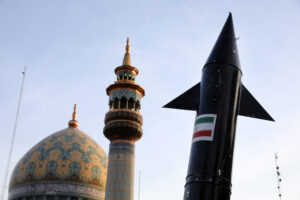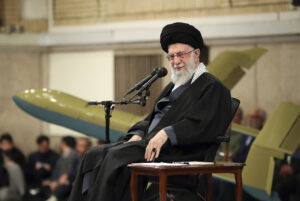How Not to Handle the Facts: Max Boot’s Pretzel Logic on Iran
Two experts on Iran tear to shreds the L.A. Times columnist's recent essay about America's "need" to intervene in that country.Editor’s note: Los Angeles Times columnist Max Boot argued in an Oct. 25 column, “How to Handle Iran,” that America should aim to topple the Iranian government with cash infusions to guerrilla groups and, perhaps, with American military force. Boot is considered by many to be the “respectable” face of neoconservatism. A senior fellow for national security studies at the Council on Foreign Relations
There are so many things wrong with Max Boot’s Los Angeles Times column, “How to Handle Iran,” one hardly knows where to begin. Three particularly egregious problems scream out, however.
First, he incorrectly attributes to Akbar Ganji a position that the Iranian dissident does not in fact advocate. Boot places Ganji in the camp of those who propose offering Iran a “grand bargain,” a deal in which the Islamic Republic would discontinue its nuclear program in exchange for the United States lifting sanctions, restoring diplomatic relations and supporting Iran’s effort to join the World Trade Organization. “[B]y establishing an embassy in Tehran and opening up more cultural and economic links with the West,” Boot writes, “we might be able to do more to foster regime change than by continuing to try to isolate the mullahs.”
In fact Ganji advocates no such thing. On the contrary, he has repeatedly reproached the West for overlooking human rights in his country and instead focusing on trade relations with Tehran, a strategy that he believes has damaged Iran’s beleaguered democrats. “Time and again,” he told the European Parliament last week, “the Western world was in its relations with Iran only concerned with trade advantages, with oil. This means that the democratic forces in our country are in difficulties.”
Indeed, Ganji’s approach to creating a democratic Iran has precious little to do with the United States at all. Not only is he against any military intervention in Iran, preferring to bring about democracy nonviolently, he also spurns financial support from the West, arguing that Iran’s struggle for democracy must be undertaken by Iranians and without the interference of foreign governments. Thus on his recent speaking tour of the U.S. he declined an offer to meet with the White House, preferring instead to meet with liberal intellectuals and human rights organizations.
The one thing he asks of the U.S. government is that it not attack Iran, as any such action would spell disaster for Iran’s democratic movement. Indeed, even the threat of military action only strengthens the Islamic Republic’s most authoritarian and repressive elements.
Second, Boot argues that the U.S. needs to spend “much more” than the $76 million the State Department earmarked last year for democracy promotion in Iran. But he fails to mention a not irrelevant fact about that $76 million: The vast majority of Iran’s democratic dissidents want nothing to do with it. Like Ganji, those dissidents want the support of global civil society — human rights groups, intellectuals, NGOs — but not of foreign powers. This appears to be lost entirely on Boot, whose advocacy for an increase in money, when its intended recipients wanted none of it the first time around, makes no sense at all.
But these “soft” measures aren’t the real deal anyway as far as Boot is concerned, as his column eventually makes clear. Washington needs to consider the option, he writes, “of going beyond peaceful measures to foment change.” Though ruling out an outright invasion, he advocates doing “to Iran what the Iranians are doing to us in Iraq,” that is, “funneling weapons and money to militias that are killing our soldiers.” Among the militias to which he advocates funneling weapons and money is the Mujahedin Khalq (MEK), an outfit Boot himself calls a “leftist political cult.” “Leftist” is euphemistic: The MEK is in fact a Stalinist political cult.
Boot mentions that the MEK “mounted attacks on Iran in the 1980s and 1990s from bases in Iraq,” but conveniently fails to mention that it was funded, supported and given cover throughout that period by Saddam Hussein himself. He also fails to mention that this group is on the State Department’s official list of terrorist organizations. (Several of Boot’s fellow neoconservatives have been campaigning for the MEK to be removed from that list, thus far unsuccessfully.)
It appears not to have occurred to Boot, or to the Mujahedin Khalq’s other conservative supporters, to find out what Iran’s human rights activists and democratic dissidents think of this “cult.” Not surprisingly, the MEK is held in near-universal disdain by those dissidents, precisely because it is a cult, a terrorist body and Stalinist in ideology — that is, undemocratic to the core. Either this contradiction hasn’t occurred to Boot or, worse, it simply doesn’t matter to him.
Likewise with what Boot calls “the only serious option left” when all is said and done: airstrikes on Iran’s nuclear facilities. What does Boot make of the fact that, without exception, every human rights activist and democratic dissident in Iran is categorically opposed to U.S. airstrikes on their country? Does this “inconvenient” fact simply not factor into Boot’s equation, or is it something that must be pushed aside in his calculus?
Whichever the case, Boot can’t have it both ways. Either he fancies himself a supporter of Iran’s democratic dissidents, in which case he has to confront the gaping discrepancies between his positions and theirs (on military strikes, on the MEK, on U.S. funding and on other issues), or he should drop the pretense of representing the views of Iran’s dissidents and frame his position in more honest terms.
As it turns out, Iran’s democratic dissidents have already solved this question for us, by making it clear that they want nothing to do with Boot’s neoconservative agenda. Boot and his fellow travelers would be well served to think through the implications of that fact.
Danny Postel is senior editor of openDemocracy (www.opendemocracy.net) and the author of the forthcoming “Reading ‘Legitimation Crisis’ in Tehran: Iran and the Future of Liberalism” (Prickly Paradigm Press, December). Nader Hashemi is an Andrew W. Mellon postdoctoral fellow in the department of political science at Northwestern University and the author of a forthcoming book on Iran and democracy.
Your support matters…Independent journalism is under threat and overshadowed by heavily funded mainstream media.
You can help level the playing field. Become a member.
Your tax-deductible contribution keeps us digging beneath the headlines to give you thought-provoking, investigative reporting and analysis that unearths what's really happening- without compromise.
Give today to support our courageous, independent journalists.






You need to be a supporter to comment.
There are currently no responses to this article.
Be the first to respond.